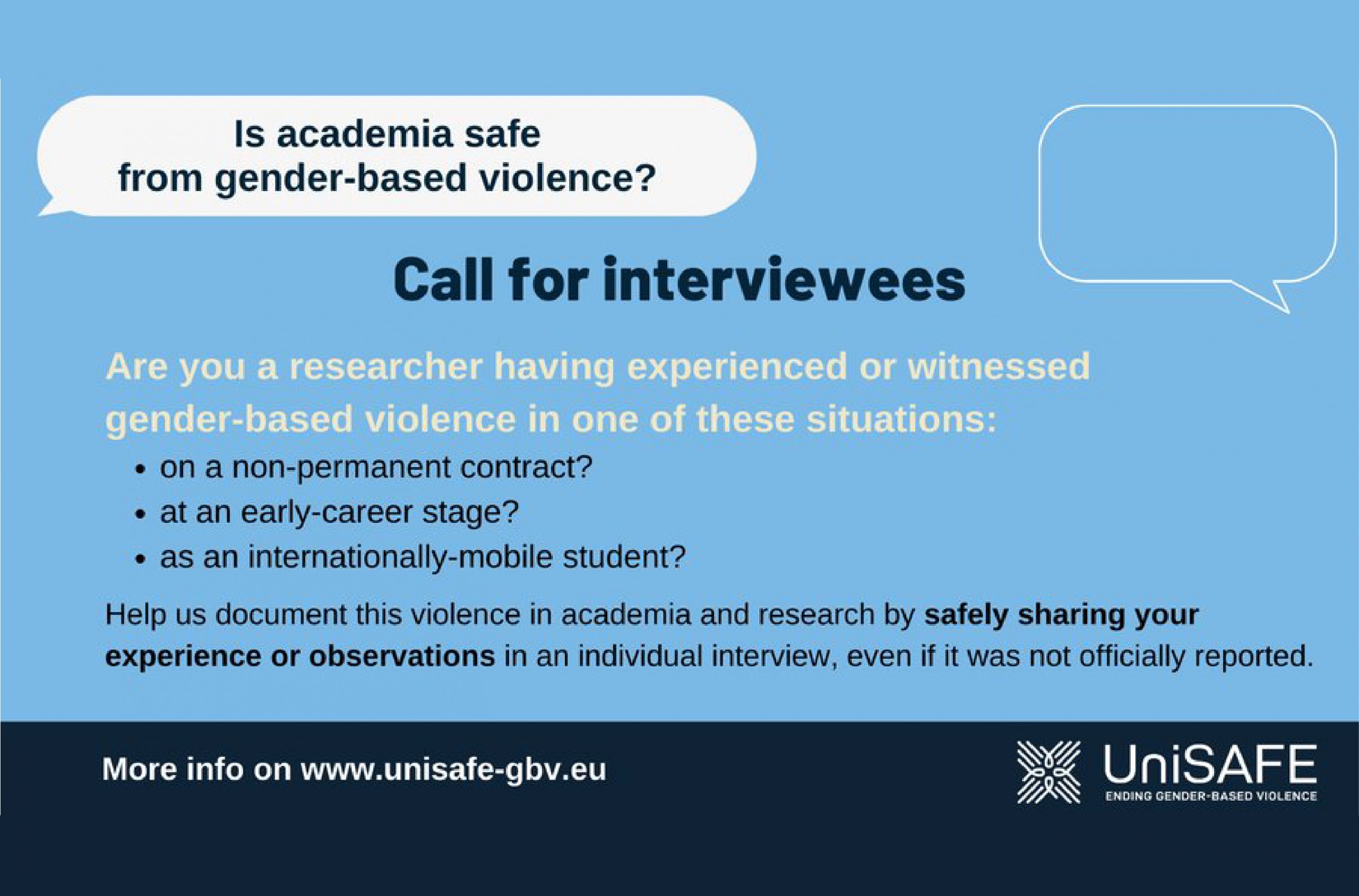Towards violence-free research organisations: interview with Anne Laure Humbert, UniSAFE project
Anne Laure Humbert, Oxford Brookes Business School, interviewed by Paola Carboni, University of Cagliari
Gender-based violence affects many organisations, with Universities and research organisations making no exception, but despite the scale of the issue, gender-based violence in research organisations is deeply under-reported and under-researched. The UniSAFE H2020 project is conducting the first large-scale study on the topic. Following the joint #SafeResearch4All awareness campaign, we had the pleasure to interview Anne Laure Humbert, a member of SUPERA international advisory board and also a UniSAFE partner.
In which forms can GBV occur in academic and research environments? Who are the victims and the perpetrators? Are the victims of intersectional discriminations more at risk?
The Istanbul Convention highlights four main forms of gender-based violence: physical, sexual, psychological and economic. In the UniSAFE project, we include all four but also consider other forms of violence relevant to the academic and research context such as sexual and gender harassment. We are also interested in emerging forms of violence, such as those linked to the increase in online activities, or the forms of violence not always recognised as violence such as institutional violence.
The issue of gender-based violence is often conflated with that of violence against women. While men represent the majority of perpetrators of all types of violence, and women are the majority of victims of gender-based violence, suffering disproportionate consequences, it is important to stress that both women and men can be perpetrators and victims. Intersectional factors play an important role besides gender alone. Being non-binary, trans, or from a sexual minority for example can increase exposure to gender-based violence, as does working in more precarious positions or not studying in one’s country of origin.
Is data available on how many people experience harassment and GBV in academia in Europe?
Few data are available on gender-based violence generally across Europe, with even fewer information available in the context of academic and research institutions. The UniSAFE project will provide the first large-scale study on this topic, providing both quantitative data through a survey carried out in 45 institutions across 15 countries and in-depth qualitative data through case studies of institutional responses in 15 countries and interviews with researchers more at risk of gender-based violence. The project is currently launching a call for researchers having experienced or witnessed gender-based violence at an early-career stage, on a non-permanent contract, or as an internationally-mobile student or staff, to share their experience in an individual interview. Find out more about the interviews.
These results will be contextualised through an extensive mapping of legal frameworks and policies at the national level and within the institutions taking part in the research.
The project has already delivered 33 country reports on national and regional policies on gender-based violence in universities, research institutes and research funding organisations, that are publicly available at this link.
What does it mean to switch from an individualist perspective to an organisational violence perspective?
Gender-based violence should not be understood solely from an individual perspective, where the traits or behaviours of either victims or perpetrators are the focus of attention. Instead, it is important to understand violence as a structural issue, and part of a system that produces and reproduces inequalities between groups, including on the basis of gender. Organisations, such as for example universities, create and uphold the norms that shape this system of inequalities. Studying organisational violence therefore means also putting the focus on the environment, and what it does to enable or challenge gender-based violence at the individual level, but also how it can be violent towards individuals in its own right. This is visible when institutions not only fail victims, but in fact revictimise and blame them in turn rather than address the problem of violence itself.
What are “violence-free” organisations and workplaces?
International standards such as the ILO Convention n.190 recognise the right for individuals to a world of work free from violence and harassment. The UniSAFE project aspires to contribute to the creation of violence-free universities and other research organisations. This can be achieved by developing policies and practices to counter violence, promoting violence-free cultures and enable leaders to support this. It is not only about eradicating different forms of violence, but also about creating and sustaining structural change of an environment where individuals feel – and are – included and safe.
How can a research institution address the issue of GBV, for instance including specific actions in their GEPs? How should institutions challenge the power structures behind GBV?
The Horizon Europe Guidance on Gender Equality Plans – aimed at supporting institutions to meet the Gender Equality Plan (GEP) eligibility criterion of Horizon Europe – recommends five content-related (thematic) areas, including measures against gender-based violence, including sexual harassment. It is likely that this will lead to an increase in the number of institutions in Europe that develop and implement actions to tackle the issue of gender-based violence. A danger, however, is that if this is only done as response to a financial incentive such as access to funding, then it will fail to properly address the power and inequality structures that are at the root of gender-based violence in the first place. It seems that many institutions are realising the extent and importance of the problem as a result of societal campaigns such as #MeToo, but all too often only putting meaningful processes and structures in place in reaction to critical incidents and/or media exposure. On an optimistic note, the UniSAFE will provide many evidence-based tools by the end of 2023 for institutions that seek to eradicate the problem and change their culture, and thus create the shift in power relations that is needed to create inclusive and safe universities and research organisations.
The project’s latest developments are regularly shared on Twitter (@UniSAFE_GBV), LinkedIn, and through a quarterly newsletter to which you can subscribe here.


